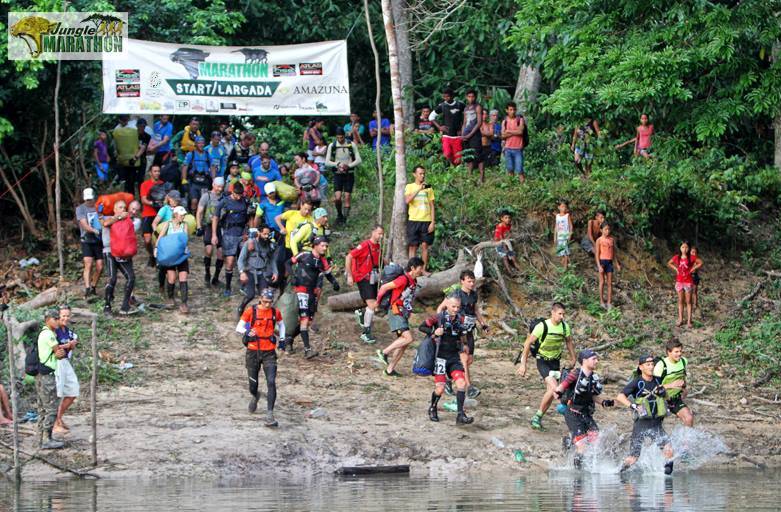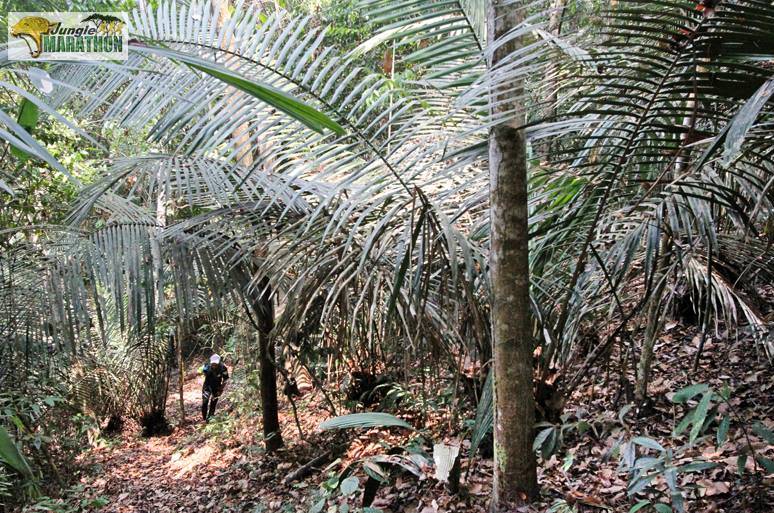RSU student calls world's toughest marathon a fantastic event
On 10 October, Alma Vītola, a second year full-time student of Rīga Stradiņš University professional bachelor study programme ”Physiotherapy”, won the seven-day Brazilian Jungle Marathon in the female category. The 254-kilometre course took the runners though the Amazon Jungle. This was the 11th Jungle Marathon, and Alma became the first from Latvia and the Baltic States to participate in the marathon.
Although there are many similar endurance races, the Brazilian Jungle Marathon is considered to be the toughest race in the world, because its route is extremely difficult. "It was hard. The weather was very hot and humid. Many participants dropped out,” says the 22-year-old Alma, however, all in all she calls this marathon a "fantastic event".

The run through the jungle has begun! Photo from the "Jungle Marathon" archive.
This year, there were 35 male and 6 female participants, of whom only 31 participants reached the finish line. Alma Vītola finished in 56 hours and 48 minutes, which was the best result of the four women who managed to complete all stages. Alma finished almost two hours ahead of her closest competitor.
The marathon consisted of six stages covering a particular distance from between 23 to 108 kilometres each day. ”The longer the stage, the easier it was. And the shorter it was, the more hills, swamps and other challenges it included.” At night participants ran using flashlights.
It took around half a year for Alma to get prepared for the race. She ran from 60 to 100 kilometres a week. Usually Alma runs in wooded areas four to five times a week. Still, she calls herself an amateur runner.
Although you knew that the Brazilian Jungle Marathon is one of the toughest endurance races, what was the hardest thing in this race?
Since I found information about this race in a CNN article on the Internet two years ago, where it was called the hardest race in the world, I took this fact into account.
We got lost many times and there were some stages of the route when I ran and was thinking to myself: it can't be that we must run here, because it is too dangerous. It can't be that a runner who has already covered 100 kilometres on that day must climb over stone blocks, swim over a river and overcome other serious challenges. Many participants dropped out due to the heat. I had severe blisters...
All in all, it was interesting. Because the jungle is not only a forest – there were also beaches and deserts, and many other things.

Photo from the "Jungle Marathon" archive.
Did you also experience any dangerous situations during the marathon?
In the jungle there are many insects which can bite you, as well as snakes, large spiders, caimans and stingrays that live in the water. I personally had nothing particularly dangerous, once I jumped over a snake. One participant was stung by a stingray before the start.
The marathon route is very complicated – although it is a track, everything is covered with leaves, which may hide holes, pits, branches, so ankles can be sprained and other injuries can be incurred. Several runners suffered ankle injuries, though.
Has someone died in this marathon in previous years?
No, no one has died!
How many kilograms did you carry on your back during the marathon?
Since the marathon organisers provide only water, we had to carry food with us for the entire week and mandatory items requested by organisers. I had to carry 10-11 kilograms on my back. I lived on sports food bars, energy drinks and instant food.
Was the win a surprise for you or a proof of your previous hard work?
It was a surprise, as I didn't know how fit the competitors would be. My goal was to enjoy the race rather than to win. The result did not come as a surprise, as we knew our result each day.
Although you were the fastest among the female participants, are you satisfied with your result?
The main thing for me was to reach the finish line.

On 19 October, RSU rector Prof. Jānis Gardovskis and university management presented a diploma, flowers and a gratuity to Alma: ”I would like to express my gratitude for carrying the RSU name worldwide! Well done! I hope that you will be as strong and good as a physiotherapist as you are as an athlete!”
What is your reason for running?
I simply enjoy it! It makes me feel good!
Why did you start running?
Once my mother's sister ran a marathon. I also wanted to improve my fitness level. Though, I have always been active, I did not take running seriously. We had one training together with my mother's sister and so it all started.
How long have you been running long distances?
I've been running for six years in total, and long distances - for about four years.
What should be taken into account while preparing for the next endurance marathons?
I got to know from other runners what I should do and consider when participating in the Brazilian marathon, and I could observe it or ignore it. Now, I have my own experience, and next time I would make some small changes to my equipment.
Do athletes help each other in such a race?
Yes, we were like one big family.
What is the prize for the Jungle Marathon winner?
All participants run for pleasure. I received a clay plate as a memory.
Do you have your next marathon already planned?
Yes, it will be a 168-kilometre race around Mont Blanc in August 2016.
Related news
 The Rector's greeting on 4 MayFor Students, RSU Alumni, For RSU Employees, For High School Students, For Teachers
The Rector's greeting on 4 MayFor Students, RSU Alumni, For RSU Employees, For High School Students, For Teachers


